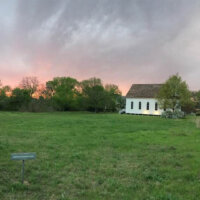When Grief Builds a Church

In the middle of my neighborhood, a chapel sits on approximately thirteen acres of prairie land. This pretty, little, white church is my happy place each morning when I load up my little one in the stroller and go exercise (by each morning, I mean twice a week at best, and I rarely break a sweat). No, I don’t live on a farm outside of Waco with Chip and Jojo, although I would happily do so. Instead, I live smack dab in the middle of the city of Dallas.
To give you the full picture, this historic church sits less than a quarter-mile from the Dallas North Tollway, walking distance to a country club, and in the heart of a bustling subdivision. A historical marker by this chapel indicates it was built in the 1890s and used as a schoolhouse and church building for a little community that has long since been forgotten. Native Americans and pioneers in covered wagons reportedly camped in the tall grasses on this Blackland Prairie.
Stay with me; I’m getting to the point. Historians say that a man named Phil Hamer constructed this chapel after losing his wife during childbirth. The church stands “as a testament to the skill and artistry of a man . . . who in his grief created a sanctuary that continues to warm hearts and comfort souls.”
It took me a while to figure out why this simple place brought me such peace and even inspiration on my daily (bi-weekly) walks. It hit me that this sweet church is a quiet, still reminder in the middle of my twenty-first-century chaos that God’s truth is timeless. Cultures change, but our need to connect with God is everlasting. Even in the 1890s, when times were simple and resources scarce, God’s people understood the need to build a place to worship and bring others to a relationship with their Lord. There’s nothing left of the community that occupied the walls of this church except this structure—the remnants of a community that was committed to having a place to worship and show an expression of their faith in the Lord.
You see, God’s truth is timeless (1 Peter 1:24). His message is for everyone. It’s life-giving and life-sustaining. From the beginning of time, we were designed to crave a relationship with God. Your kids crave God. Your kids’ kids’ kids will long for a relationship with the Lord. We may have better methods of communication, increased knowledge, more means and wherewithal—but the simple truth is that our deepest need is for a connection with God. This innate need transcends all time and gives us the same purpose and design as those over one hundred years ago who built this church and those one hundred years in the future who will have a whole new set of problems.
If we truly believe that God’s truth is timeless, shouldn’t it be unmistakable in everything we do? Does our calendar reflect our belief that only the things of the Lord will last? Do we judge our earthly success and failure in the light of our belief that only one thing will remain when it’s all said and done? Does our parenting reflect that, of all the things we can possibly give our kids, the only thing they really need is a relationship with God? Think about this. Will our kids one day be able to say that one thing was undeniable: our highest priority in all we did as a family was to bring us closer to Jesus?
God’s truth and his mission for our lives should leave a mark on everything we do—so much so that we act similar to a grief-stricken man in the 1890s who willed himself to build a church because it mattered. Jesus is the same yesterday, today, and forever (Hebrews 13:8). His truth is eternal and, when you consider that, other priorities lose their urgency and somehow find their rightful place. Who will be encouraged a century from now to follow God because of what you are doing today?
Phil Hamer had no way of knowing that his work in the 1890s would someday provide a heavenly perspective in the shadows of a bustling neighborhood and major thoroughfare. Or that his faithfulness in building a sanctuary would be a reminder a century later of the timeless need we each have for a relationship with God. And that his work would be a testament to the Lord’s ability to use our temporary grief for his greater good.
But God knew.







